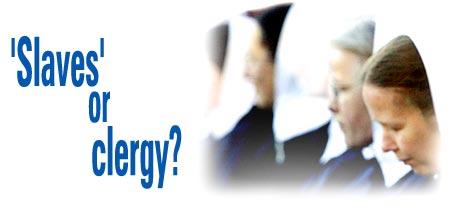Home > News > Specials
The Rediff Special/George Iype
February 06, 2004

Indian priests and nuns are increasingly in demand in Europe and the United States. But are these clergy people working to further the church's ecumenical work on foreign shores or made to work as 'slaves' in monasteries and nunneries?
Nuns Rosamma Kizhakkedath, 37, Jessy Xavier Kizhuppilliparambil, 31, Mary Easy Neeliveetil, 36, and Thresia Kacharayil, 44, travelled to Europe some years ago to join the Brigittine Order, a congregation of nuns that runs a large number of convents across the world including India.
The Italian press reported recently that these Indian nuns and two others whose names have not been revealed ran away from the Brigittine convent last year alleging 'maltreatment, moral violence and working conditions close to slavery.'
According to the Union of Catholic Asian News, UCAN, a widely circulated Church news service, Abbess General of the Brigittine Order Mother Tekla Famigilietti, 66, could face trial following an investigation by an Italian prosecutor on the alleged discrimination meted out to the Indian nuns.
The Vatican has also ordered an investigation into the case.
UCAN says the Indian nuns story made headlines in Italy, not just because of the allegations of discrimination, but also because Mother Tekla is one of the most influential and powerful women in the Catholic Church.
Mother Tekla has friends in high places -- bishops and cardinals; she also has access to Pope John Paul II. Last March, she visited Cuba to receive a building as a gift from President Fidel Castro. Two months ago, she dined with the King and Queen of Sweden in Stockholm.
According to the monastic tradition of the Brigittine Order, their chief obligation is liturgical prayer. Central in the nuns' work is the guesthouse, which is part of the activity of every Brigittine convent. The nuns welcome all who seek to find stillness and quiet.
The Indian nuns alleged ill-treatment, including 'moral violence,' occurred at the convent. They also complained they were given little time to pray or meditate.
According to UCAN, the nuns alleged they had to work as receptionists and do menial tasks at the convent.
The Italian press likened their situation to 'working in conditions close to slavery.'
Some reports claim the Indian nuns were not allowed to apply for National Health Care cards; others say Mother Tekla took away their passports. When they fled the convent, Mother Tekla asked the police to withdraw their sojourn permits, thereby exposing them to expulsion from Italy.
But the nuns appealed to an Italian court, which permitted them to stay in the country.
After leaving the Brigittine Order, the Indian nuns have been employed by the Benedictine Order. They live at a Benedictine convent near Parma city in northern Italy.
Mother Tekla's defenders have rejected the charges of discrimination or maltreatment, contending that most of what the Indian nuns did is normal practice in many religious orders.
They also argue that most Brigittine nuns are from India or Mexico, and many Indians hold responsible leadership positions throughout the order. Therefore, charges that nuns from the Third World are discriminated against are difficult to sustain.
The Brigittine Order runs seven convents across India, with Bangalore as its headquarters. Its Indian Provincial General Sister Regina is in Italy these days, attending the congregation's annual meeting and trying to sort out "the delicate India issue," said Sister Ann, Superior of the Brigittine convent in Kerala.
"The nuns ran away from the convent in Italy without informing the superiors. It seems that after staying in Europe for long, they wanted to get out of the convent. Our congregation cannot be faulted if a nun wants to get out of the spiritual life we lead," Sister Ann told rediff.com
But other Indian nuns and priests whom rediff.com spoke to said they are appalled at the incident.
"This is one of the many instances of discrimination against Indian nuns and priests in the West. Rich Western congregations recruit poor Catholics from India to become nuns and priests. But very often we suffer maltreatment and abuse," a senior Catholic priest at the Carmelite Mary Immaculate congregation said, speaking on condition that he would not be identified.
An acute shortage of priests and nuns has forced Western congregations to recruit clergy from India. Approximately 46,000 priests serve 19,000 parishes in the US. A recent US National Conference of Catholics Bishops survey said some 2,334 parishes in the US are without resident pastors.
The Catholic Bishops Conference of India does not have data about how many Indian priests and nuns work in Europe and the US. But it says India sends the largest number of priests and nuns to many countries, including the US, for higher studies and employment.
A Catholic nun from Kerala, who worked in Belgium at a leading congregation, said she was "suffocated in the convent atmosphere."
"There is not much spirituality in the convents there. Some convents act like commercial enterprises. I worked in a convent, which invested money in a stock broking firm. I came back because I had no work," she disclosed.
There is nothing surprising that Indian nuns are fleeing European convents, she said.
Photograph: Uriel Sinai/Getty Images
Image: Uday Kuckian